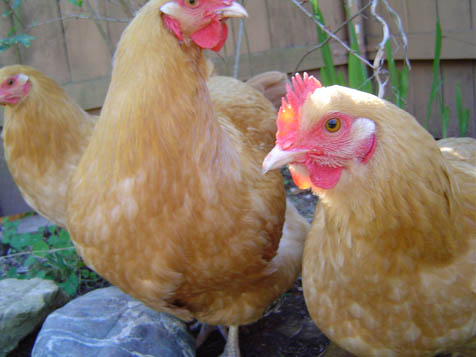Chickens in the City
Raising Hens as Pets

Tough economic times call for drastic measures. If your kids want a pet, but you are more concerned with putting food on the table, consider getting pet chickens. Yes, you read that right, chickens. Chickens are easy to care for and inexpensive when compared to other pets. Plus, you can have fresh, nutritious eggs on a daily basis; quality nitrogen-rich fertilizer and nontoxic pest and weed control. Not to mention, chickens are friendly animals with individual personalities. Plus, it’s better for the environment. Food that’s grown locally requires fewer resources to get that food to your table.
Surprisingly, chickens can adapt very well to the constraints of an urban environment. Though, like all pets, they do have certain requirements. I spoke with bird expert Joanne Alexander-Horne, who expressed the following: “Chickens are wonderful companion birds. They are highly social and need interaction with people or other chickens and they really must be able to cruise around and be able to jump up onto perches, chairs, things that they would do normally in the wild or in a farm sanctuary. Chickens also need to be able to dust bathe (like a chinchilla) in order to keep their feathers clean. They should be fed a diet of ground up oyster shell, chicken pellets, greens, collards, turnip, and romaine every day. Calcium is a major issue for chickens kept as companions. Many domestic chickens die from a calcium deficiency; you can get a liquid form from the vet to supplement, but the aforementioned greens will fill that void. If people cannot provide all of those important things, they should not have them.”
There are many things to consider before getting chickens. First, you must check your local ordinances. Many cities are starting to allow hens, but most won’t allow roosters as they are perceived as noisy and would fall under noise ordinances. You will need enough room for a chicken coop. A good rule of thumb is four square feet inside the coop per chicken and 10 square feet of outdoor space. You will also need nest boxes where the chickens can lay their eggs and bird netting to protect your outdoor run from hawks. Chickens are susceptible to diseases, so make sure you know of an avian veterinarian. Most importantly, tell your neighbors what you’re doing. You can try to bribe them with free eggs since most chicken owners end up with more eggs than they know what to do with.
Tanya Gazdik Irwin, a friend of mine from Detroit, has a neighbor who raises hens. When I asked her if she has any complaints about the noise or smell from the chickens, she stated: “There is no noise since she has only female hens and there’s no smell because she cleans up after them, just like a dog. She’s had them for two years and the neighbors are fine with it. They are so smart, if you rattle a plastic bag they come running because they know they are getting a treat. They are very friendly and social. Plus, their eggs are so much tastier than even the organic free-range ones at the grocery store.”
The design store Rooms & Gardens in downtown Santa Barbara has a chicken coop at the back of the store. When I heard of this, I had to see it for myself. I must say that I was quite impressed with the setup. Plus, the chickens really seemed to be enjoying themselves. When I asked Laura, the store manager, what made them decide to get hens for their store, she told me that the owners’ sons were interested in having chickens as pets and thought it would be fun to have the chickens at the store since they already had a garden in the back. They also wanted to show that raising chickens isn’t as dirty as people think and a chicken coop can be done stylishly. Luckily, the neighbors don’t seem to mind. A nearby employee said that there’s something wonderful about chickens and she loves listening to them. The chickens aren’t producing many eggs yet, but Rooms & Gardens hopes to someday trade their eggs for coffee at Tuttini.
Not all chicken owners are as thrilled. I spoke to a co-worker whose cousin and his girlfriend raise chickens in the city. They find the chickens much more annoying than they expected. Apparently, their chickens have eaten all their succulents! Since chickens like to eat almost anything, make sure you know what NOT to feed your chickens. This Web site has a list of all foods that are good and bad for chickens: http://www.backyardchickens.com/web/viewblog.php?id=2593-Treats_Chart
On the downside of having chickens in the city, unless you plan on keeping the chickens for their entire eight-year lifespan (which I hope you do), you will need to consider what you’ll do with the unwanted birds. If your main reason for keeping the chickens is for their eggs, most chickens only have a productive life (one egg per 1.5 days) for two to three years. They may still produce as they get older, just not as often. Sadly, most factory farms cull their chickens after only two years. Secondly, if you are hatching your own chicks, plan on half of them being roosters. Since most cities won’t allow roosters and they’ll likely kill each other and harm the hens, you will need to find homes for them. This is obviously a very difficult task as we all know what happens to male chicks on factory farms.
Given the appropriate situation, chickens can make excellent companion animals. Although this pet idea is a bit different, it can work well with some thought and planning ahead. It will teach your children responsibility in caring for pets and also give you wholesome, fresh eggs for your breakfast table.
Animal News
Animal Shelter Assistance Program (ASAP) Offers Free Microchipping
ASAP has just begun microchipping all the cats at their shelter at no cost to the adopter. This registration is valid for the life of the cat. It is the responsibility of the adopters to keep their contact information updated. The first year subscription comes with insurance from Home Again in the instance that the cat is injured and needs veterinary care while lost.
C.A.R.E. 4 PAWS announces their “Project ResponsiBULL”
C.A.R.E. 4 PAWS, short for Community Awareness Responsibility and Education, wants to help combat the misconceptions about the pit bull and restore its family dog image. Sign up for their free three-part program:
• Part I: Fix a Pit
Spay or neuter your pit bull or pit bull mix FREE of charge through C.A.R.E.4Paws in collaboration with Santa Barbara’s D.A.W.G. Includes microchipping and basic shots.
• Part II: Pit-Ed
Our FREE pit bull ownership workshop discusses the dos and don’ts of owning a pit bull along with the myths and misconceptions about the breed.
• Part III: Train a Pit
Learn to be the leader of the pack and build a stronger relationship with your dog during our FREE three-week basic obedience class.
To sign up for the next session, call 968-CARE (2273) or email info@care4paws.org.

Adoptable Pet of the Week
Chief is a three- to four-year old, neutered male cattle dog who weighs 70 pounds. This is a very smart, active, athletic breed that needs lots of mental and physical stimulation. This boy is an experienced and tireless running partner. He’d also like a try at Flyball and Agility. He is a social, affectionate, loyal pup who needs to be an integral part of an active family.
DAWG (Dog Adoption and Welfare Group) is a no-kill not-for-profit dog rescue/adoption organization located at 5480 Overpass Road in Goleta. For more information, call 681-0561. You can view more adoptable dogs at sbdawg.com. The public is invited to stop by and look around every day from 9 a.m. to 4 p.m. DAWG relies on volunteers to take care of all the dogs, so if you love dogs, think about volunteering. Students are able to fulfill their volunteer community service requirement by volunteering. Volunteer orientations are generally held every other Saturday at 10 a.m. Contact DAWG for the next meeting.



